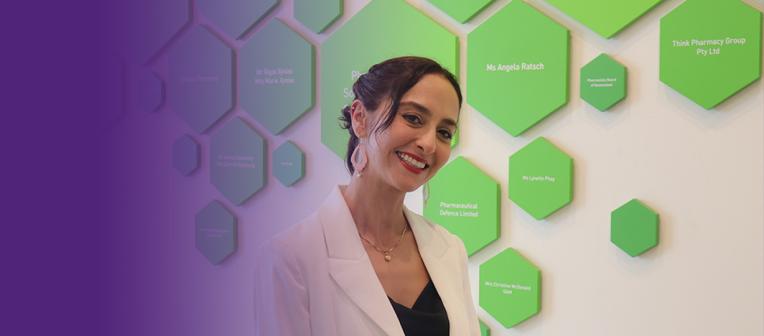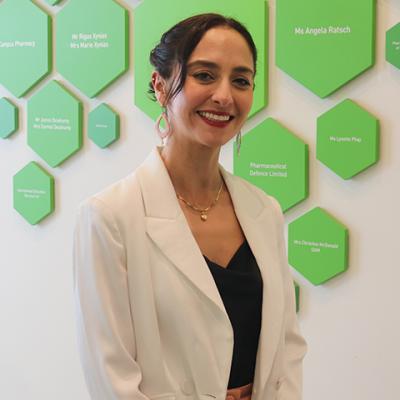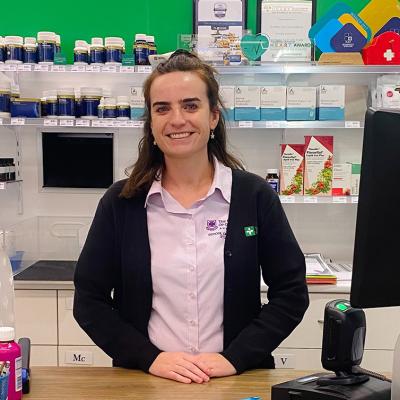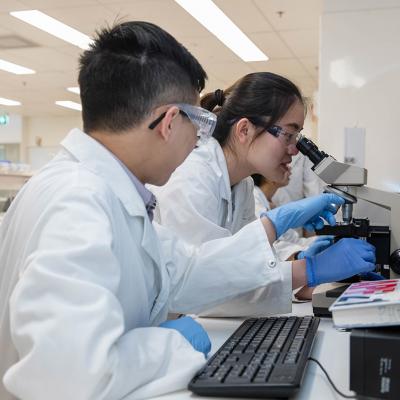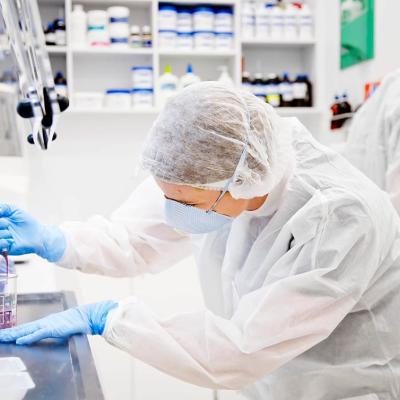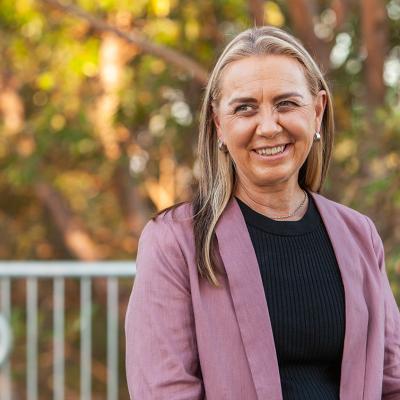Meet Dr Nazanin Ghahreman-Falconer, a Lecturer at UQ’s School of Pharmacy and Pharmaceutical Sciences.
Nazanin has worked as a pharmacist in community and hospital settings for 20 years and is passionate about improving patient safety and quality of care.
As well as lecturing at UQ, she works at the Princess Alexandra Hospital in a senior research role. Here she aims to build research capacity in the hospital’s pharmacy department and across Metro South Health by mentoring aspiring hospital pharmacists.
Teaching the next generation of pharmacists
Nazanin says she loves the diversity of her role and the opportunity she has to educate and empower the next generation of pharmacists and researchers.
“I get to work closely with students and clinicians, and I especially love to teach, because I can develop the next generation of pharmacists – my future colleagues,” she says.
“I love teaching both undergraduates and postgraduates and feel lucky to be able to contribute to the third-year Medicines Management course and the Master of Clinical Pharmacy program at UQ.”
“Our master’s is an excellent program for pharmacists who want to develop their clinical practice and enhance their professional skills.”
Nazanin says its particularly rewarding to see the growth and development of students, junior researchers and colleagues.
“You get to see your mentees become independent thinkers and researchers helping patients and our academic community – to see our amazing programs of research, which take time and are a labour of love, translate into practice,” she says.
Improving patient safety
Having worked as a hospital pharmacist for many years, Nazanin is passionate about patient safety and researching ways to use technology to reduce medication harm.
Her research interests include risk-prediction modelling, medication safety and clinical informatics to optimise patient care.
She supervises Higher Degree by Research (HDR) and Honours students conducting research on machine learning in clinical practice and extended scope pharmacy services in acute care settings.
“We can use risk-prediction models embedded in digital tools to help pharmacists identify who is at high risk, for example, when working in busy hospitals where you need to triage patients for clinical review,” she says.
“This can help provide a targeted review so that those that need our help the most are seen in a timely manner.”

Nazanin is a co-supervisor of 6 PhD students, conducting research to develop new tools that employ risk-prediction models using AI and antibiograms to assist with optimal prescribing of antibiotics. They’re also researching novel service models to facilitate collaborative prescribing of medication to improve patient safety and health outcomes.
“Their research projects are hugely exciting and likely to transform patient care in Australasian hospitals,” says Nazanin.
For example, Nazanin and her PhD candidates are working on projects to develop:
- digital risk prediction tools to help hospital pharmacists identify patients at greatest risk of medication harm for timely clinical review
- tools to reduce hospital readmissions due to medication harm
- digital tools to help determine risk of venous thromboembolism.
“We’re also researching extended scope roles for pharmacists such as partnered charting of medications in digital hospitals, and pharmacists working as part of the emergency resuscitation teams.”
Cutting-edge curriculum
The UQ School of Pharmacy and Pharmaceutical Sciences is currently redesigning their curriculum, incorporating cutting-edge digital tools and novel teaching methods to optimise student learning.
“This shows our commitment to staying current with the growth of the pharmacy profession,” says Nazanin.
“This ensures that future pharmacists are well equipped with the latest clinical knowledge and skills, ultimately contributing to improved patient care and safety.”
Incorporating more workplace-based learning opportunities and bridging the gap between academic knowledge and practical application is also a key focus.
“In terms of pharmacy practice itself, we are quickly expanding the roles of pharmacists in the hospital setting with novel service models,” she says.
“This reflects the evolution of our profession, maximising the contributions of pharmacists but also enhancing healthcare delivery by utilising their expertise in new and specialised areas.”
Nazanin says the redesign of the curriculum also acknowledges the increasingly significant role that technology plays in healthcare.
“This adaptability is crucial for pharmacists to integrate seamlessly into modern healthcare systems, fostering more efficient and patient-centred practices.”
Read more about how the role of pharmacists is evolving with new technologies: Pharmacist vs machine: pharmacy services in the age of large language models
The future of pharmacy
Nazanin says UQ pharmacy students will graduate at the forefront of the profession, armed with a toolkit of knowledge, resources and collaborators, ready to practise as patient-centred healthcare professionals who can quickly adapt to the needs of the workforce.
“After your pharmacy degree, you’ll have many work options, including working in community, hospital, aged care or research/teaching focused roles – it’s a great time to be a pharmacist,” she says.
“You could practise for a few years, then come back and do your PhD just as I did – the best thing I ever did! I feel I have more potential to have greater impact on patient outcomes."
"I love my role as a pharmacist, academic and researcher and am happy to provide advice to anyone wanting to know more.”

